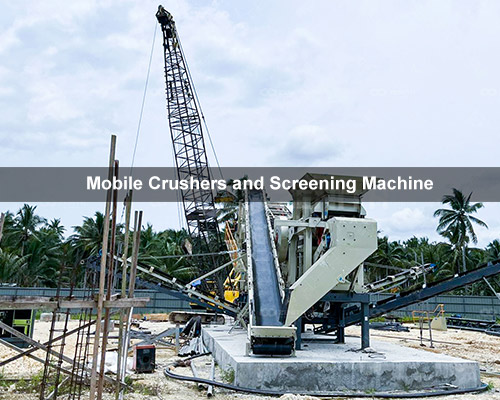Mobile Crushers and Screening Machine Quote
July 10, 2025
Summary:Looking for top-quality mobile crushers and screening machines? Get a competitive quote today! Discover cost-effective, efficient, and eco-friendly solutions for your crushing and screening needs.
Investing in mobile crushing and screening equipment is a significant decision for any quarrying, mining, or recycling operation. Whether you’re processing aggregates, demolition waste, or minerals, getting an accurate mobile crushers and screening machine quote is crucial for budgeting and project planning. However, pricing isn’t simple – it varies dramatically based on numerous factors. This guide demystifies the process, helping you understand what influences costs and how to secure the most competitive quote.

Why is Getting a Quote So Important?
Unlike standard consumer goods, mobile crushers and screens are highly configurable pieces of heavy machinery. A quote provides a detailed breakdown of the specific equipment package you need, tailored to your application, desired output, and site conditions. It moves beyond ballpark figures to a concrete price point, enabling:
- Accurate Budgeting: Avoid unexpected costs and ensure project feasibility.
- Informed Comparison: Evaluate different manufacturers, models, and configurations objectively.
- Negotiation Power: A formal quote is the starting point for discussions with suppliers.
- Clarity on Scope: Understand exactly what is included (equipment, options, warranties, delivery).
Key Factors Influencing Your Mobile Crusher and Screening Machine Quote:
- Equipment Type and Configuration:
- Crusher Type: Jaw crushers, impact crushers, cone crushers, and gyratory crushers all serve different purposes and come at vastly different price points. Primary crushers generally cost more than secondary or tertiary units.
- Screen Type: Inclined screens, horizontal screens, scalping screens, and trommel screens vary significantly in complexity and cost. Features like deck configuration (single, double, triple) and screen media type also impact price.
- Size and Capacity: Larger machines designed for higher throughput naturally command higher prices than smaller units.
- Mobility Platform: Track-mounted equipment typically costs more than wheeled/trailer-mounted options due to the complex undercarriage system.
- Power Source: Diesel-hydraulic and diesel-electric drives are standard. Pure electric options (if available) might have different cost implications depending on infrastructure needs.
- Brand Reputation and Quality:
- Established, premium brands with proven reliability, advanced technology, and strong aftermarket support often come with a higher initial purchase price. However, this can translate to lower lifetime operating costs (TCO).
- Less well-known or budget brands may offer lower upfront quotes but potentially higher long-term maintenance or downtime costs.
- Machine Specifications and Features:
- Engine Tier: Compliance with emission regulations (e.g., Tier 4 Final/Stage V) affects engine cost.
- Automation & Control Systems: Advanced automation, remote monitoring (telematics), and sophisticated control panels add cost but enhance efficiency and diagnostics.
- Wear Parts & Materials: Machines built with harder wearing materials or offering easier access for maintenance might have a higher initial cost.
- Optional Features: Dust suppression systems, magnet options, specialized wear packages, additional conveyors (e.g., stockpiling conveyors), and advanced safety systems all add to the base price.
Understanding the “Hidden” Costs (Beyond the Base Quote):
- Transportation & Setup: Getting the machine to site and commissioning it.
- Maintenance & Spare Parts: Regular servicing, wear parts (liners, screens, bearings), and fluid costs.
- Fuel Consumption: A major ongoing operational expense.
- Operator Costs: Skilled operators are essential.
- Insurance: Protecting your significant investment.
- Financing Costs: Interest if purchasing via a loan or lease.
How to Get the Most Accurate and Competitive Quotes:
- Define Your Needs Precisely:
- Material type and feed size?
- Desired end product specifications (size, shape)?
- Required hourly/annual production capacity?
- Site conditions (space, terrain, access, regulations)?
- Fuel/power source availability?
- New, used, or rental preference?
- Must-have features (e.g., dust control, remote monitoring)?
- Research Reputable Suppliers: Look for manufacturers and dealers with strong track records in your specific application and region. Check reviews and ask for references.
- Request Detailed Quotes: Provide potential suppliers with your detailed requirements. Ask for itemized quotes that clearly break down:
- Base machine cost
- Cost of all selected options and accessories
- Warranty terms
Example Quote Ranges (Indicative Only – Prices Vary Widely):
- Small Mobile Jaw Crusher (Wheeled): $150,000 – $350,000 USD
- Mid-Size Tracked Cone Crusher: $400,000 – $750,000 USD
- Large Tracked Impact Crusher: $600,000 – $1,200,000+ USD
- Mobile Scalping Screen: $200,000 – $450,000 USD
- Mobile Triple-Deck Screening Plant: $350,000 – $700,000 USD
- Full Crushing & Screening Train (Crusher + Screen + Conveyors): $1,000,000 – $3,000,000+ USD
Remember: These are broad estimates. A specific quote for your needs is essential.
Conclusion: Your Quote is the Starting Point
Obtaining a mobile crushers and screening machine quote is the critical first step in making an informed capital equipment investment. By understanding the multitude of factors influencing the price and carefully defining your operational requirements, you can approach suppliers with confidence. Request detailed, comparable quotes, consider the Total Cost of Ownership, and don’t hesitate to negotiate. Armed with the right information and a clear quote, you’ll be well-positioned to select the optimal mobile crushing and screening solution that delivers value and productivity for your business for years to come.
